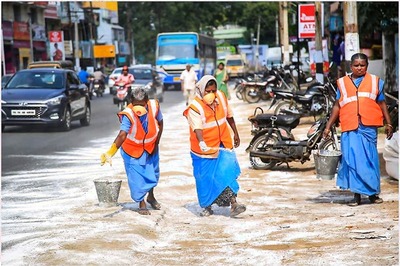
views
New Delhi: The South Delhi Municipal Corporation’s (SDMC) proposed a ban on displaying meat at food stalls, in the name of hygiene, has failed to convince public health experts.
“There are ways and means of making street food safer. You can’t just stop selling it,” Padma Shri awardee Prof. Indira Chakravarty told News18.
The SDMC passed a private member’s resolution barring shops and vendors from displaying either raw or cooked meat. Leader of House, Shikha Rai told the media that she approved it because of “hygiene concerns” and to protect the “sentiments of people affected by the sight”.
Speaking solely of hygiene concerns, Professor Chakravarty said that while some meat products do putrefy faster than some vegetarian items, much can be done to help vendors keep them safe.
“Even vegetarian curries start putrefying soon. A ban such as this will hit the street vendors the hardest as they don't have an indoor space to shift their food to,” she added.
Chakravarty suggested a series of simple measures that can make street food safer. Vendors can be taught to serve hotter food, to cover their wares, their carts and stands can be set up at better spots, they should be given better access to water, she said.
“The Bureau of Indian Standards (BIS) came out with a list of revised standards for food safety requirements, based in WHO recommendations, last year,” said Chakravarty, who was involved in the process.
As the standards mention, there is an increasing dependency on different types of street foods.
“One cannot say they're universally unhygienic,” said Chakravarty, adding that cities such as Bangkok run on street food.
This ban is an added layer of harassment for street vendors, said Sangeeta Singh of the National Association of Street Vendors of India (NASVI). “What does the MCD know of the protein content of meat and that of soya chaap to know what stays hygienic and what doesn't,” she said.
“That's the job of the Food Safety and Standards Authority of India (FSSAI) and of the Delhi government's food safety department.”
Two years ago, she recalled, the Delhi High Court, had said that street food vendors would be governed by the Food Safety Act of 2005 and the Street Vendors Act, 2014. “How is the MCD,” she asked, “passing such a ban that will affect the livelihoods of the vendors?”
The judgment had come after NASVI approached the court over a ban on sugarcane juice during April-September, again for hygiene reasons. Singh fears that these bans will force the vendors to only pay more money, as bribes, to the police and the municipal corporation.
“About 30 percent of the vendors in Delhi are food vendors. They can't stop selling their food,” she said.
The resolution has now been sent to the Commissioner, to accept or reject.




















Comments
0 comment